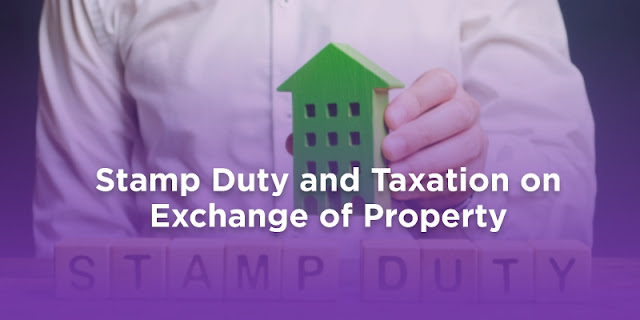Stamp Duty and Taxation on Exchange of Property
Selling and buying property anyplace across the globe comes with numerous tax requirements which must be met by both parties. If not, the transactions could be illegal. Know what you must do to accomplish in both scenarios.
If a property is bought the sale is carried out through the use of cash. But, it’s not mandatory to add money to the transfer of property. Transferring property exchange for another is permitted in law. Indian legislation on properties. In the same way, exchanges can be between a residence and a commercial location or even a residential area with another residential location. There are many options to trade between residential property, commercial properties, land, or under-construction properties. Based on the difference in the value of the property, it is possible that the differences may be settled through the method of payment. But, it is essential to consider taxes on income Tax and stamp duty consequences in the transaction.
If you are selling your property, you must start a sale agreement or sale agreement. This is a requirement and must conform to the property’s market value. A deed of exchange is required to transfer property, and it is different from a sale. In this article, you’ll get information regarding the tax and stamp duty procedure for the exchange of property.
Stamp Duty Implications on the Exchange of Property
In the event of selling a property, it is essential to sign the sale deed or sale agreement. It must have a stamp with the amount for the worth of the house.
To be able to make an exchange of property, an exchange deed is needed, because an exchange transaction is distinct from a sale. There is also the possibility to create two sale deeds, but in this scenario, it is necessary to pay the stamp duty on each of the agreements. Different states have their own laws and therefore it is essential to verify to see if the law is applicable to the specific state.
The value, in the context, to calculate stamp duty is regarded as the property that has the highest market value. For instance, if you switch your smaller flat for a larger one within the same building, the stamp duty is due according to the value that is market for the larger flat.
Regarding the amount of stamp duty, it must be jointly agreed upon by each of the parties. In the event of the sale deed, in case there isn’t a mutual agreement between the parties the buyer must pay the price in the form of stamp duties. However, in the case in the event of an exchange issue has to be resolved through an understanding of the other parties.
In accordance with the law, an exchange deed is a legal document that claims the right to transfer ownership rights on immovable property as per section 54 under the Transfer of Property Act; it is required to be recorded with the office of the registrar.
The exchange of property that is immovable comes with a tax consequence. If the property is exchanged within a time that is longer than 24 months, then any profit or loss is considered to be long-term. If the exchange is a term less than 24 months, then any loss or gain that is made during the acquisition of the property is considered to be short-term.
There is a possibility in both parties do not be able to add value to the property aside from the difference in the deed of exchange. In this scenario, it is necessary to determine how much capital you have earned, it is necessary to know the price of your home according to stamp duty and compare it to the cost that the property was initially bought at. Furthermore, if the property was held for more than 24 consecutive months in total, you’ll be able to benefit from the tax benefits of indexation and exemption methods through Sections 54 and 54F and 54EC.
What happens in the event of the need for an Exchange of a Residential Property?
In the event of an exchange for residential properties and the exemption is obtained by claiming Section 54. There is no tax obligation for the person who is trading the smaller flat for the larger one. In the same way, if you buy an apartment that is smaller, with a market value roughly equal to the index capital gains for the long-term, calculated in the same manner as the larger flat, there is no tax obligation.
If you are considering the possibility of exchanging your land or commercial properties in exchange for a residential property, the details must be verified to ensure that the investment amount into the residence is at least equal to the worth of the commercial property or land that is to be exchanged. If there is a deficit the possibility of investing in capital gain bonds in accordance with Section 54EC is possible. No matter what in the event that you exchange your residential or commercial land, with another unit of commercial or land and there is no tax exemption. To be eligible for an exemption on capital gains over the long term that results from the exchange, you must make an investment in a residential home that is required under Section 54F or in capital gain bonds as per Section 54EC.
Conclusion
The explanation above provides a thorough understanding of taxation and stamp duty when you exchange properties. It gives you a clear understanding of not receiving any tax benefits when you swap one property for another, although you could save by avoiding stamp duty with the exchange document.




Comments
Post a Comment